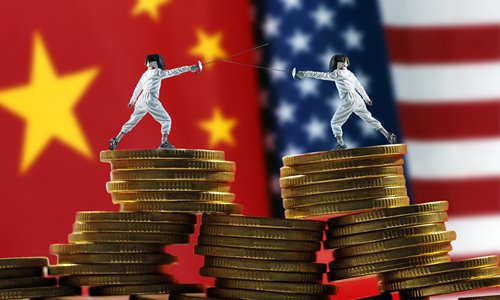HOME >> OPINION
China’s monetary sovereignty stands strong
By Wang Wen Source:Global Times Published: 2019/9/2 21:03:40

Photo: GT
After arriving in Ecuador, I found it was the US dollar, rather than local currency, that was in circulation. This reminded me of the dollarization policy which has been prevalent in many countries since 20 years ago. And for the first time I felt strongly about the vital significance of our research topic - monetary sovereignty, which is almost completed by the think tank I work for.
At the end of the 20th century, some Latin American countries and emerging market entities proposed a dollarization scheme, which suggested replacing domestic currencies with the US dollar and seeking to eliminate exchange rate risks. According to an IMF report, in 1998, in seven countries, foreign currency (mainly US dollar) deposits were more than 50 percent of national money supplies. In 12 countries, the ratio was 30-50 percent. Certain regional powers, including Turkey and Argentina, had a relatively high dollarization ratio.
In the view of these countries' policymakers of the time, US dollar was a world currency with strong stability and high intrinsic value.
Twenty years have passed. On reviewing the dollarization policy, we can find obvious negative effects. No country that has given up monetary sovereignty can truly achieve sustainable economic growth. On the contrary, in Latin America, financial crisis has broken out periodically; in countries such as Thailand and Cambodia, overdependence on the US dollar has led to economic plight. Even a global power like Japan has seen long-term economic stagnation since its exchange rate was under tremendous pressure from the US in 1985.
In contrast, China's ability to maintain monetary sovereignty is stronger than most countries, and so is its determination. Such sovereignty serves as the monetary base of China to maintain an average growth rate of 9 percent in the past 70 years, and an essential reason for the country to keep a relative balance amid China-US economic and trade frictions.
In essence, monetary sovereignty is part of a country's governance system. It represents public support for the country's domestic system and reflects external investors' confidence in the country's market. For a rising power like China with a long history, monetary sovereignty is a major symbol of national identity which can unite the people. In addition, monetary policy is also an incentive for the domestic economy to benefit from the strength of its own currency, to link export and import, and to drive medium- and high-speed economic growth.
Weeks ago, US President Donald Trump labeled China a "currency manipulator," when Chinese yuan experienced a temporary depreciation, trying to interfere in the yuan's exchange rate. The US has obviously underestimated the Chinese people's confidence in its currency, neglected their will to protect monetary sovereignty and misread the global market's signal of using yuan to hedge China-US trade risks.
There is an interesting phenomenon. US retail giant Costco opened its first brick-and-mortar store on the Chinese mainland last Tuesday. As Trump is trying to order US enterprises to leave China, Costco saw an unprecedented number of customers flock to its store on the Chinese mainland. Costco's shares rose to a record high in the US with the news of grand opening in China.
In the year 2019, Costco is marching toward China, moving against the current of China-US trade disputes. This again confirms that a significant global economic change is happening. China is expected to surpass the US for the first time to become the world's largest consumer market this year. Global investors and Chinese consumers are all voting with their feet to express their confidence in yuan and China's future.
In Ecuador, many friends of mine were disappointed by the current radical dollarization policy. But it does not seem possible to go back. China has drawn many lessons from Latin American countries' experience, and how to maintain an independent relationship with the US is the most important one. A country may become a US vassal state if it stays too close to Washington. But it may become an enemy of the US if it stays too far away.
By suppressing China, the US wants to maintain global hegemony. But by countering the US, China aims at protecting its own sovereignty. China's purpose is more just. For Chinese people, the US dollar's exorbitant privilege is a bullying act in the finance sector. Fortunately, China's yuan is rising unhindered, and the nation has dealt a blow to the US dollar's exorbitant privilege in defending monetary sovereignty. However, this is still a difficult path and China needs to walk in a more steady fashion.
The author is professor and executive dean of Chongyang Institute for Financial Studies, at Renmin University of China and executive director of China-US People-to-People Exchange Research Center. His new book Great Power's Long March Road was launched recently. wangwen2013@ruc.edu.cn
RELATED ARTICLES:
Posted in: COLUMNISTS,VIEWPOINT